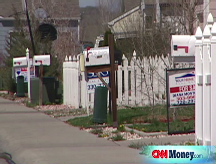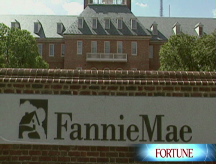Paulson in hot seat over Fannie, Freddie
Treasury chief goes to Congress to seek authority to stand behind mortgage finance giants. He finds some support but plenty of skeptical probing.
NEW YORK (CNNMoney.com) -- Treasury Secretary Henry Paulson was hammered by lawmakers on Tuesday over the Bush administration's plan to prop up mortgage finance giants Fannie Mae and Freddie Mac.
Members of the Senate Banking Committee drilled into Paulson on a day when the shares of Fannie and Freddie were once again pummeled by investors.
Paulson was asked about his request that Congress remove limits on how much money Treasury can lend to the troubled mortgage finance firms - was it just a "blank check" from taxpayers? He also faced questions about a second part of the plan - to allow Treasury to buy equities in the firm - and whether Fannie and Freddie are as safe as the companies, Treasury and regulators now claim.
"I fear we're sitting on a financial powder keg," said Sen. Richard Shelby, R-Ala., the committee's ranking Republican.
Paulson told the committee that the two firms have adequate capital to continue operating. He said that proposals he announced on Sunday - expanding the Treasury credit line for or buying equity in Fannie and Freddie - were "backstops" to assure the markets.
"Our proposal was not prompted by any sudden deterioration in conditions at Fannie Mae or Freddie Mac," Paulson said. "At the same time, recent developments convinced policymakers and the [firms] that steps are needed to respond to market concerns and increase confidence by providing assurances of access to liquidity and capital on a temporary basis if necessary."
And he said while the rescue plan would only be authorized through the end of 2009, it is important to put as few restrictions as possible on Treasury's ability to act if problems do occur in those times. Paulson argued that the best way to assure the markets was to give the broadest possible guarantees of access to government capital by those firms. He said that's the best way to make sure there is no need for Treasury to loan them money or buy their equity.
"If you've got a squirt gun in your pocket, you probably will have to take it out," Paulson said. "If you have a bazooka in your pocket and people know it, you probably won't have to take it out."
The rescue plan won some support, most notably from Sens. Christopher Dodd, D-Conn., and Charles Schumer, D-N.Y. But the amount of opposition and skepticism from other members of the committee, both Democrat and Republican, suggested that hopes voiced by Paulson and Dodd for action on the proposal within the next week may be a long shot.
One Republican, Sen. Jim Bunning, R-Ky, vowed to do everything in his power to defeat the proposal, which Schumer took as a threatened filibuster that could stall the proposal dead in its tracks. Schumer told Paulson that if he wanted the plan passed, the White House would have to push Republicans to join Democrats who supported the plan. Paulson agreed that the typical partisan fights would have to be put aside if it were to pass.
"I hope we can get this done quickly and we don't take hostages," he said to Schumer.
Dodd and Paulson hope the measure can be added to a broad housing reform bill. One part of that measure, long sought by Republicans, would impose greater regulatory oversight of Fannie and Freddie. It also includes a plan, pushed by Democrats, to have the Federal Housing Administration provide help to homeowners facing foreclosure.
The legislation passed the Senate on Friday and is now back before the House for consideration. The effort to put the now controversial rescue plan into that legislation could provide new obstacles for its passage.
The two firms, known as government sponsored enterprises, or GSEs, were set up by Congress to help provide mortgage funding, but they are owned by private sector shareholders. Their shares have plunged in recent days among concerns that they would need to raise additional funds to cover future losses or need to be taken over by its federal regulator. Either step would reduce or wipe out the value of current shareholders' stakes.
Paulson said that he believed the problems facing Fannie and Freddie were caused by their the historic downturn in housing. He argued that sustaining the firms was crucial to not only the recovery of the housing market but also to protecting the nation's reputation in global markets.
"The confidence in their securities are essential to confidence in our financial markets," he said.
But other senators questioned whether the rescue plan would reward management and shareholders who should have seen problems coming due to the downturn in housing. And some even questioned if trying to rescue the firms at this point is really the best course.
"The question we are really going to be dealing with is this a model that works any more?" asked Sen. Chuck Hagel, R-Neb.
Paulson, who has led the government's response to the tumult over Fannie and Freddie, took the brunt of the questioning. Federal Reserve Chairman Ben Bernanke sat through most of the hearing and made virtually no comments. Executives from Fannie and Freddie did not testify.
Dodd, chairman of the Banking Committee, said the current crisis requires unprecedented measures.
"Inaction is not an option in my view," Dodd said. "We can not just watch events unfold."
Dodd repeated comments in recent days that he believes Fannie and Freddie are both operating on a sound financial basis. "I think it's very important that we not contribute to the unwarranted fear," he said. "This is a time for calm."
But Republican Shelby questioned whether conditions are more dangerous than those assurances would suggest.
"If the enterprises are operating in a safe and sound manner, what are we doing here today? Well, we all know why we're here," Shelby said in his opening statement. "The GSEs, even when they're deemed safe and sound, can pose systemic risk."
Paulson did concede that even though he believes the firms are well capitalized, he agrees they pose a risk to the broader financial system. He said that's part of the reason the rescue plan has been proposed.
"Our plan is aimed at supporting the stability of financial markets, not just these two enterprises," said Paulson.
Bunning, a longtime critic of Fannie and Freddie, cited the firms' stock slide since the plan was announced. "Your plan is not being accepted," Bunning said.
Paulson responded that "there's not something any of us can do is stabilize the stock price." He pointed to more positive signs such as the fact the spread between Fannie and Freddie debt and treasury yields has narrowed.
Bunning also questioned whether Paulson's expectation that the authority to loan significantly more money or buy equity will not be used if it is authorized.
"There's a lot of us who would like to believe what you're saying," said Bunning. "But we're skeptical. Anytime we approve something, it gets used."
Shares of Fannie (FNM, Fortune 500) plunged 27% on Tuesday, leaving them off 64% just this month. Freddie (FRE, Fortune 500) shares tumbled 26%, leaving it down 68% so far in July. Both have lost more than 80% of their value since the start of the year.
Fannie and Freddie are a key source of funding for banks and other home lenders. Their ability to provide that funding is seen as a key to any recovery in housing and the economy as a whole.
The companies were set up by Congress, but they are owned by shareholders, who have fled the firms' stock recently on fears that continued problems in housing and rising mortgage defaults will force them to seek significantly more capital, a move that would dilute the value of existing shares.
On Sunday evening, Paulson announced a proposal by Treasury to have Congress raise the $2.25 billion it is allowed to loan the two firms, and even open the door for the federal government to buy shares in the two companies if needed. The Fed announced it stood ready to loan money to the firms if they needed access to funds ahead of congressional actions. ![]()





